Switzerland
 From Conservapedia
From Conservapedia | Schweizerische Eidgenossenschaft (German) Confédération suisse (French) Confederazione Svizzera (Italian) Confederaziun svizra (Romansch) | |
|---|---|
| Flag | Coat of Arms |
| Capital | Bern |
| Government | Federal State, Direct democracy |
| Language | [[German, French, Italian, Romansh]] (official) |
| President | Guy Parmelin |
| Area | 41,285 sq mi |
| Population | 8,700,000 (2020) |
| GDP | $700,000,000,000 (2020) |
| GDP per capita | $80,460 (2020) |
| Currency | Swiss franc |
Switzerland is one of the wealthiest country in the world, located in Central Europe between Germany, Italy, France, and Austria. Its capital is Bern, and its largest city is Zurich. Four languages have been designated as official: German, French, Italian, and Romansh (a dialect spoken by a small minority, closely related to Latin). Switzerland was traditionally founded on August 1, 1291, and it gained independence from the Holy Roman Empire in 1499. It is a confederation of 26 cantons with elements of direct democracy in that all laws passed by Parliament can be overturned by arranging a referendum. Switzerland is also well known for having strict neutrality.
Among Western European countries, Switzerland has a relatively low level of belief in the theory of evolution, and a relatively higher level of prayer and church attendance.[1]
Contents
People[edit]
Switzerland sits at the crossroads of several major European cultures, which have heavily influenced the country's languages and cultural practices. Switzerland has four official languages—German, French, Italian, and Romansch (based on Latin and spoken by a small minority in the Canton Graubunden). The German spoken is predominantly a Swiss dialect, but newspapers and some broadcasts use High German. Many Swiss speak more than one language. English is widely known, especially among professionals.
More than 75% of the population lives in the central plain, which stretches between the Alps and the Jura Mountains and from Geneva in the southwest to the Rhine River and Lake Constance in the northeast. Resident foreigners and temporary foreign workers make up about 20% of the population.
According to the Swiss Federal Office of Statistics, the population in Switzerland increased to an estimated 7,523,934 by July 2006. Three-quarters of this growth was attributed to migration. Switzerland naturalized 22% more people in 2006 compared to 2005, totaling 46,700 persons. By the end of 2006, there were 850,000 foreigners working legally in Switzerland. The rise of German immigrants, as confirmed in earlier reports, increased by 10.6% (+10,000). Portuguese workers also increased by 7.4% (+7000). On the other hand, the number of the Italians continued to drop by –3.2% (-5000). The major ethnic groups are: German 65%, French 10%, and Italians 6%.
Almost all Swiss are literate. Switzerland's 13 university institutes enrolled 111,100 students in the academic year of 2004–05. About 25% of the adult population holds a diploma of higher learning.
The Constitution guarantees freedom of worship, and the different religious communities co-exist peacefully. While the majority of the Swiss population is still nominally Christian, like much of Europe, the country is quickly becoming secular. Despite this trend, Evangelical Christianity has seen rapid growth in Switzerland recently.[2]
Switzerland consistently ranks high on quality of life indices, including highest per capita income, one of the highest concentrations of computer and Internet usage per capita, highest insurance coverage per individual, and high health care rates. For these and many other reasons, it serves as an excellent test market for businesses hoping to introduce new products into Europe.
Government[edit]
Switzerland is a federal state composed of 26 cantons (20 are "full" cantons and six "half" cantons for purposes of representation in the federal legislature) that retain many attributes of sovereignty, such as fiscal autonomy and the right to manage internal cantonal affairs. The 1874 Constitution began, "Together, the peoples of the 23 sovereign Cantons of Switzerland united by the present alliance..." Similarly, under the current 2000 Constitution, cantons hold all powers not specifically delegated to the federation. Switzerland's federal institutions are:
- A bicameral legislature—the Federal Assembly;
- A collegial executive of seven members—the Federal Council; and
- A judiciary consisting of a regular court in Lausanne—the Federal Tribunal—and special military and administrative courts.
- The Federal Insurance Tribunal is an independent division of the Federal Tribunal that handles social security questions; its seat is in Lucerne.
- The Federal Criminal Court, located in Bellinzona, is the court of first instance for all criminal cases under federal jurisdiction.
- The Constitution provides for separation of the three branches of government.
Federal Assembly[edit]
The Federal Assembly is the primary seat of power, although in practice the executive branch has been increasing its power at the expense of the legislative branch. The Federal Assembly has two houses—the Council of States and the National Council. These two houses have equal powers in all respects, including the right to introduce legislation. Legislation cannot be vetoed by the executive nor reviewed for constitutionality by the judiciary, but all laws (except the budget) can be reviewed by popular referendum before taking effect. The 46 members of the Council of States (two from each canton and one from each half canton) are directly elected in each canton by majority voting. The 200 members of the National Council are directly elected in each canton under a system of proportional representation. Members of both houses serve for 4 years.
The Federal Assembly meets quarterly for 3-week plenary sessions. The parliamentary committees of the two houses, which are often key in shaping legislation, meet behind closed doors, but both majority and minority positions are presented during the plenary sessions. The Federal Assembly is a militia parliament, and members commonly retain their traditional professions. Individual members of parliament have no personal staff.
The Assembly can be legally dissolved only after the adoption of a popular initiative calling for a complete revision of the Constitution. All citizens 18 or older have the right to vote and run for office in national, cantonal, and communal elections unless individually disqualified by the relevant legislature.
Federal Council[edit]
The top executive body is the seven-member cabinet called the Federal Council. The Federal Assembly individually elects the seven Federal Councilors in a joint session of both houses at the opening of a new legislature. Federal Councilors are elected for 4-year terms; there are no term limits and no provision to recall the cabinet or individual members during the legislature. Each year, the Federal Assembly elects from among the seven Federal Councilors a president and vice president, following the principle of seniority. The member who is vice president one year traditionally is elected president the next. Although the Constitution provides that the Federal Assembly chooses and supervises the cabinet, the latter has gradually assumed a preeminent role in directing the legislative process as well as executing federal laws.
Under an arrangement between the four major parties called the "magic formula" which was introduced in 1959 but ended in December 2003, two Federal Councilors (ministers) were elected each from the Christian Democrats (CVP), the Social Democrats (SP), and the Free Democrats (FDP) and one from the Swiss People's Party (SVP). Under the new magic formula starting January 1, 2004, the new party composition of the cabinet changed to the following composition: 1 Christian Democrat, 2 Social Democrats, 2 Free Democrats, and 2 representatives of the Swiss People's Party. This arrangement was shaken up in the aftermath of the 2008 federal elections: a leftist coalition of Social Democrats, Greens and Christian Democrats formed a parliamentary majority to oust Councilor Christoph Blocher, the iconic leader of the Swiss People's Party, from office even though his party had just achieved a decisive electoral victory. He was replaced by party colleague Evelin Widmer-Schlumpf, who was subsequently banned from the party for conspiring against Blocher, along with fellow Councilor Samuel Schmid. Both Widmer-Schlumpf and Schmid were much more moderate on the political spectrum, as opposed to the conservative Blocher. The two went on to form a new breakaway party, the Conservative Democratic Party (BDP). The Swiss People's Party has since returned as a participant in the national government following the demission of Schmid in 2008, who was replaced by Ueli Maurer, and following the resignation of Widmer-Schlumpf in 2015 after a record election for the SVP and a poor election for the BDP, being replaced by Guy Parmelin of the SVP.[3]
The Constitution requires that Federal Councilors act collectively in all matters, not as individual ministers or as representatives of their parties. Each Councilor heads one of seven federal departments and is responsible for preparing legislation pertaining to matters under its jurisdiction. The president, who remains responsible for the department he heads, has limited prerogatives and is first among equals (there is no formal prime minister).
Federal Council Membership[edit]
The Swiss Federal Council, as of 2020:
- Finance — Ueli Maurer (SVP)
- Environment, Transport, Energy and Communications — Simonetta Sommaruga (SP) — President for 2020
- Home Affairs — Alain Berset (SP)
- Economic Affairs, Education and Research — Guy Parmelin (SVP) — Vice President for 2020
- Foreign affairs — Ignazio Cassis (FDP)
- Defence, Civil Protection and Sports — Viola Amherd (CVP)
- Justice and Police — Karin Keller-Sutter (FDP)
- Federal Chancellor — Walter Thurnherr (Ex Officio, CVP)
Judiciary[edit]
The administration of justice is primarily a cantonal function. The Federal Tribunal is limited in its jurisdiction. Its principal function is to hear appeals of civil and criminal cases. It also hears complaints of violations of the constitutional rights of citizens and has authority to review cantonal court decisions involving federal law as well as certain administrative rulings of federal departments. However, it has no power to review federal legislation for constitutionality. The Tribunal's 30 full-time and 30 part-time judges are elected by the Federal Assembly for 6-year terms. The Federal Criminal Court is the court of first instance for criminal cases involving organized and white-collar crime, money laundering, and corruption, which are under federal jurisdiction. The Court's 11 judges are elected by the Federal Assembly for 6-year terms.
Local Government[edit]
The cantons regulate local government. The basic unit of local government, which administers a village, town, or city, is the commune or municipality. Citizenship is derived from membership in a commune and can be conferred on non-Swiss by a commune. Cantons are subordinate to federal authority but keep autonomy in implementing federal law.
Referenda[edit]
A strong emphasis on ballot votes arises out of the traditional Swiss belief that the will of the people is the final national authority. Every constitutional amendment adopted by parliament is automatically brought to the ballot and has to carry a double majority of votes and cantons in order to become effective. The voters themselves may actively seek changes to the Constitution by means of the popular initiative: 100,000 voters may with their signatures request a national vote on a proposed constitutional amendment. New federal legislation also is subject to popular review, under the so-called referendum: 50,000 signatures suffice to call a ballot vote on any federal law adopted by parliament. The Assembly can declare an act to be too urgent to allow time for popular consideration, but this is rare. At any rate, an act passed urgently must have a time limit and is later subject to the same constitutional provisions on popular review as other legislation. This device provides a useful channel for linking laws closely to the will of the people and reducing the influence of elites. A stunning example of this process occurred in November 2009, when Swiss voters turned out at the polls in huge numbers to approve of an amendment to the constitution banning the construction of minarets.[4] This decision of a vast majority of voters to take a stand against political Islam came after a campaign in which the establishment elites had presented a unified front against the measure: all political parties except the Swiss People's Party had strongly opposed the suggested amendment, and most of the media openly mocked its supporters as racist and foolish.
Swiss citizens are capable of not taking proposals personally: for instance, proposals for longer vacations, or for basic (government funded) income for every citizen have been rejected by public referenda.
Political Conditions[edit]
Although it has a diverse society, Switzerland has a stable government. Most voters support the government in the armed neutrality underlying its foreign and defense policies. Domestic policy poses no major problems, but the changing international environment has generated a significant reexamination of Swiss policy in key areas such as defense, neutrality, and immigration. Quadrennial national elections typically produce only marginal changes in party representation.
In recent years, Switzerland has seen a gradual shift in the party landscape. The rightist Swiss People's Party (SVP), traditionally the junior partner in the four-party coalition government, more than doubled its voting share from 11% in 1987 to 22.5% in 1999, and finally to 26.6% in 2003, thus overtaking its three coalition partners. This shift in voting shares ended the 44-year old "magic formula," the power-broking agreement of the four coalition parties, and gave a second seat in the 7-person Swiss cabinet to the Swiss People's Party at the expense of the Christian Democrats, now the weakest of the four major parties. For the first time in Swiss history, the SVP has two seats in the government, reflecting its new status as Switzerland's most popular party. As of the 2015 federal elections, the SVP received 29.4% of the popular vote and has 65 seats in the national council, records for the party.[5]
On December 10, 2003, Christoph Blocher—a self-made industrialist and main figure of the right-populist Swiss People's Party known for his strong opinions on asylum and migration and law and order issues—was elected to the cabinet by parliament, replacing the incumbent Christian Democrat Justice and Police Minister Ruth Metzler. The parliament also elected the Free Democrat Hans-Rudolf Merz to replace retiring Finance Minister Kaspar Villiger. Both Blocher and Merz were strong advocates of drastic public spending cuts in order to reduce the country's mounting $102 billion francs state deficit and staunch opponents to Switzerland's entering the European Union. On June 14, 2006, the Federal Council elected Doris Leuthard of the Christian Democratic Party. Leuthard replaced the retiring Joseph Deiss and has assumed the Economics and Trade portfolio that Deiss managed. Leuthard's election and Deiss’ resignation did not change the dynamics of the Federal Council. Blocher was not re-elected in 2007.
The Constitution limits federal influence in the formulation of domestic policy and emphasizes the roles of private enterprise and cantonal government. However, the Confederation has been compelled to enlarge its policymaking powers in recent years to cope with national problems such as education, agriculture, energy, environment, organized crime, and narcotics.
EU relations and politics[edit]
Because every country surrounding Switzerland, with the exception of Lichtenstein, is a member of the European Union, matters related to the EU are prominent in Swiss politics. In 1992, the Swiss government applied for membership in the European Economic Area (EEA), but on a referendum on December 6, 1992, at a "historically high" turnout of 78.7%, the Swiss population narrowly rejected membership in the organization, even though the liberal elites strongly supported membership.[6][7] After that, starting in 1993, several bilateral agreements were adopted between the Swiss Government and the EU, which allowed Switzerland to integrate with the EU without joining the EU or EEA.[6] In 2001, immediate membership negotiations with the EU were overwhelmingly rejected by the Swiss people, with 76.8% voting against, in a referendum held on March 4.[7][8] Despite these victories for EU-sceptics, Swiss voters approved other referendums advocating for increased integration with the EU, including accepting several bilateral agreements and joining the Schengen Area, which removed all border controls, and Swiss voters also rejected several referendums advocating for reversing integration.[7] Despite this, on February 9, 2014, Swiss voters narrowly approved a referendum proposed by the right-wing and anti-EU Swiss People's Party that intends to limit immigration through quotas (which violates the EU principle of the free movement of people), requires businesses to give Swiss citizens priority when hiring, and restricts immigrants accessibility to benefits.[9] Additionally, in 2016, Switzerland withdrew[10] its frozen application for EU membership, which had been dormant since 1992, accepting a motion introduced by SVP parliamentarian Lukas Reimann.[11][12][13]
Despite not being a member of the EU, Switzerland contributes to the EU budget.[14] Switzerland continued surrendering its sovereignty and caving to the EU when it approved stricter gun control laws to align with the EU's open borders Schengen Area.[15]
Gun politics[edit]
Compared to the rest of the world in general, Switzerland has relatively expansive gun rights and one of the highest levels of gun-ownership in the world, much due to its system of military conscription.
In 2015 and 2016, gun sales in the country rose dramatically due to concerns about defense against terrorism and crime, along with fears that EU regulations (that Switzerland is forced to adopt due to the globalistic Schengen Area) would reduce citizens' ability to purchase a weapon.[16] Predictably, leftists voiced worries of this trend, even though they forget that the gun surge is a direct result to their failed policies concerning terrorism, crime, and European integration.[17]
Motorways of Switzerland[edit]
See also: Motorways of Switzerland
Europe’s best roads, those found in the Netherlands and Switzerland, are also among the world's finest. The Global Competitiveness Report 2019, published by the World Economic Forum ranked 141 countries based on their performance in a variety of different categories. Switzerland was ranked as having the second best roads in Eruope.[18]
Foreign Relations[edit]
Traditionally, Switzerland has avoided alliances that might entail military, political, or direct economic action. Since its forces suffered a major military defeat in the Battle of Marignano in 1515, it has stayed strictly neutral. Switzerland maintains diplomatic relations with almost all countries and has no major dispute in its bilateral relations. Historically, it has served as a neutral intermediary between hostile powers and host to major international treaty conferences. After World War I, it hosted the League of Nations headquarters; during World War II it represented German interests in America and American and British interests in Germany. Since 1980, Switzerland has represented American interests in Iran. It also played a key role in brokering a truce agreement between the Sudanese Government and Sudan's Peoples Liberation Army (SPLA) for the Nuba Mountain region, signed after a week's negotiations taking place near Lucerne in January 2002.
The Swiss Constitution declares the preservation of Switzerland's independence and welfare as the supreme objective of Swiss foreign policy. Below this overarching goal, the Constitution sets five specific foreign policy objectives: to further the peaceful coexistence of nations; promote respect for human rights, democracy, and the rule of law; promote Swiss economic interests abroad, alleviate need and poverty in the world; and preserve natural resources.
The Swiss feel a moral obligation to undertake social, economic, and humanitarian activities that contribute to world peace and prosperity. This is manifested by Swiss bilateral and multilateral diplomatic activity, assistance to developing countries, and support for the extension of international law, particularly humanitarian law. Switzerland (mainly Geneva) is home to many international governmental and nongovernmental organizations, including the International Committee of the Red Cross (whose flag is essentially the Swiss flag with colors reversed—the Red Cross historically being a Swiss organization). One of the first international organizations, the Universal Postal Union, is located in Bern.
International Organizations[edit]
In recent years, the Swiss have broadened the scope of activities in which they feel able to participate without compromising their neutrality. Swiss voters first rejected United Nations membership by a 3-to-1 margin in 1986 but in March 2002 adopted it, albeit in a very close election, making Switzerland the first country to join the UN based on a popular referendum decision. In similar fashion, the electorate rejected a government proposition to deploy Swiss troops as UN peacekeepers (Blue Helmets) in 1994, but Switzerland joined NATO's Partnership for Peace and the Euro-Atlantic Partnership Council in 1996 and 1997, respectively, and deployed Yellow Berets to support the OSCE in Bosnia. In June 2001, Swiss voters approved new legislation providing for the deployment of armed Swiss troops for international peacekeeping missions under UN or OSCE auspices as well as closer international cooperation in military training.
On September 10, 2002, Switzerland became a full member of the United Nations. Switzerland had previously been involved as party to the Statute of the International Court of Justice and member of most UN specialized agencies, as well as the International Atomic Energy Agency. Switzerland has long participated in many UN activities, including the Economic Commission for Europe, UN Environment Program, the UN High Commissioner for Refugees, UN Educational, Scientific and Cultural Organization, UN Conference for Trade and Development, UN Industrial Development Organization, and the Universal Postal Union (UPU). Prior to its formal accession, Switzerland had maintained a permanent observer mission at UN Headquarters since 1948.
Switzerland also is a member of the following international organizations: World Trade Organization, Organization for Economic Cooperation and Development, European Free Trade Association, Bank for International Settlements, Council of Europe, and Organization for Security and Cooperation in Europe (OSCE). In 1992, Swiss voters approved membership in the Bretton Woods organizations but later that year rejected the European Economic Area agreement, which the government viewed as a first step toward EU membership.
Switzerland has furnished military observers and medical teams to several UN operations. Switzerland is an active participant in the OSCE, its foreign minister serving as Chairman-in-Office for 1996. Switzerland also is an active participant in the major nonproliferation and export control regimes.
War on Terror[edit]
The Swiss Government on June 25, 2003, eased most of the sanctions against the Republic of Iraq in accord with UN Security Council Resolution (UNSCR) 1483. The government lifted the trade embargo, flight restrictions, and financial sanctions in place since August 1990. The weapons embargo and the asset freeze, the scope of which was extended, remain in force, and restrictions on the trade in Iraqi cultural goods were newly imposed. Though not a member at the time, Switzerland had joined UN sanctions against Iraq after the invasion of Kuwait. Switzerland in recent years joined UN and EU economic sanctions imposed on Sierra Leone, UNITA (Angola), Liberia, Serbia and Montenegro, Burma, Zimbabwe, Sudan, Democratic Republic of the Congo, and Côte d'Ivoire. On October 15, 2003, the Federal Council ended the import restrictions on raw diamonds from Sierra Leone and lifted sanctions against Libya.
Switzerland in October 2000 implemented an ordinance to enforce UN sanctions against the Taliban (UNSCR 1267), which it subsequently amended in April 2001 in accord with tighter UN regulations (UNSCR 1333). On May 2, 2002, the Swiss Government eased the sanctions regime in accord with UNSCR 1388 and 1390, lifting the ban on the sale of acetic acid (used in drug production), Afghani Airlines, and Afghani diplomatic representations. The weapons embargo, travel restrictions, and financial sanctions remain in force. The Swiss Government in November 2001 issued an ordinance declaring illegal the terrorist organization al Qaeda as well as possible successor or supporting organizations. More than 200 individuals or companies linked to international terrorism have been blacklisted to have their assets frozen. Thus far, Swiss authorities have blocked about 72 accounts totaling 34 million francs.
In August 2017, Switzerland suspended funds to a Palestinian NGO due to its ties to terrorism.[19]
Defense[edit]
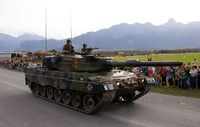
On May 18, 2003, Swiss voters approved the military reform project "Army XXI" that drastically reduced the size of the Swiss Army. In January 2004, the 524,000-strong militia started paring down to 220,000 conscripts, including 80,000 reservists. The defense budget of SF 4.3 billion ($3.1 billion) would be trimmed by SF 300 million, and some 2,000 jobs were expected to be shed between 2004 and 2011. The mandatory time of service was curtailed from 300 to 260 days. All able-bodied Swiss males aged 20 to 30 must either serve in the military or in a special civil service. Thereafter, most military personnel are assigned to civil protection duties until the age of 37. Each Swiss militaman is required to keep his Sig 550 service rifle at home, properly maintained and in working order. Up until 2007, soldiers also received a sealed box of 50 bullets: they were meant to be used in the journey from home to the reporting station in case of invasion. This requirement has since been abolished and ammunition returned.
A new category of soldiers called "single-term conscripts" will discharge the total time of service of about 300 days of active duty in one go. Recruiting is on a voluntary basis and should not exceed 20% of a year's draft. The armed forces have a small nucleus of about 3,600 professional staff, half of whom are either instructors or staff officers, with the remainder mostly being fortification guards. The army has virtually no full-time active combat units but is capable of full mobilization within 72 hours. Women may volunteer to serve in the armed forces and may now join all units, including combat troops. About 2,000 women already serve in the army but, so far, have not been allowed to use weapons for purposes other than self-defense. The armed forces are organized in four army corps and an air force and are equipped with modern, sophisticated, and well-maintained gear. In 1993, the Swiss Government procured 34 F/A-18 fighters from the United States.
Switzerland has a rich history of providing mercenaries to the battlefield of Europe, ever since the Middle Ages up until the Napoleonic period. Nowadays Swiss citizens are forbidden to join foreign armies, with the notable exception of the Pontificial Swiss Guard (Guardia Svizzera Pontificia) which constitutes the tiny armed forces of the State of the Vatican City. In order to join, Swiss male citizens must have a proven Catholic faith and a certificate of good conduct from the Army, besides meeting physical criteria.
During the Cold War, Switzerland had plans to build nuclear weapons. Detailed plans were produced, and Switzerland had a storage of uranium and unsuccessfully tried to purchase plutonium. However, the Treaty on the Non-Proliferation of Nuclear Weapons, signed in 1969 and ratified in 1977, seemed to be a better alternative, and the program wound down until it was dissolved in 1988.[20][21][22]
Economy[edit]
Despite a dearth of natural resources, the Swiss economy is among the world's most advanced and prosperous. Per capita income is virtually the highest in the world, as are wages. Trade has been the key to prosperity in Switzerland. The country is dependent upon export markets to generate income while dependent upon imports for raw materials and to expand the range of goods and services available in the country. Switzerland has liberal investment and trade policies, notwithstanding agriculture, and a conservative fiscal policy. The Swiss legal system is highly developed, commercial law is well defined, and solid laws and policies protect investments. The Swiss franc is one of the world's soundest currencies, and the country is known for its high standard of banking and financial services. Switzerland is a member of a number of international economic organizations, including the World Trade Organization (WTO), the International Monetary Fund, the World Bank, and the Organization for Economic Cooperation and Development (OECD).
Switzerland's machinery, metals, electronics, and chemicals sectors are world-renowned for precision and quality. Together they account for well over half of Swiss export revenues. In agriculture, Switzerland is about 60% self-sufficient. Only 7.5% of the remaining imports originated from the U.S. Swiss farmers are one of the most highly protected and subsidized producer group in the world. OECD estimates show that Switzerland is subsidizing more than 70% of its agriculture, compared to 35% in the EU. According to the newly adopted "2008-2011 Agricultural Program", Switzerland intends to reduce its subsidies from SF 14.1 billion (U.S. $11.6 billion) to SF 13.6 billion (U.S. $10.5 billion) over the next four years. In March 2007, the parliament increased the initial government bill by SF 150 million (U.S. $123 million) on the grounds that Swiss farm reforms were going too fast. The parliament also accepted international parallel imports for fertilizers and tractors. Swiss farmers will be allowed to import tractors produced in China or India and sold in the EU, and save up to $41 million (SF 50 million) annual in expenses. German fertilizer could save another $20 million (SF 25 million). A more general bill on parallel imports will be presented by the Justice Ministry to parliament by the end of 2007.
Tourism, banking, engineering, and insurance are significant sectors of the economy and heavily influence the country's economic policies. Swiss trading companies have unique marketing expertise in many parts of the world, including Eastern Europe, the Far East, Africa, and the Middle East. Not only does Switzerland have a highly developed tourism infrastructure (making it a good market for tourism-related equipment and services), the Swiss also are intrepid travelers. Per capita, more Swiss visit the United States every year than from any other country. Tourism is the most important U.S. export to Switzerland (earning almost $1.5 billion). In 2004, more than 285,000 Swiss came to the United States as tourists.
In 2005, the dollar/Swiss franc exchange rate continued to be shaped by geopolitical tensions. The dollar depreciated further against the Swiss franc from SF 1.49 in October 2002 to SF 1.31 in 2003, to 1.28 in 2005 to 1.23 in July 2006, and 1.22 in January 2007. The strengthening of the Euro, however, helped Switzerland to minimize the pressure from a weakening dollar. The Swiss National Bank raised interest rates on June 15, 2006, to 1.5%, the third increase since January 2006. The Swiss National Bank also said it expected economic growth to be a robust 2.5% in 2006 and 2007.
While the number of bankruptcies in Switzerland had been on the rise for four years, reaching alarming levels in 2005 (10,800), the rate dropped by 4.7% in 2006. Compared to other European countries, Switzerland's bankruptcy rates ranks fourth (1.35%) among the hardest hit countries, after Luxemburg (2.39%), Austria (1.9%) and France (1.49%).
The Swiss economy expanded by 2.7% in 2006, the fastest rate in six years, thus confirming sustained growth over the last four years. GDP growth was primarily due to the positive evolution of private consumption and expansion of investment in fixed assets and software. For once, all export industries benefited from increased demand from foreign markets. With a surplus of $9.6 billion (SF 11.7 billion), the Swiss trade balance reached unprecedented levels. On the inflation side, import prices increased more rapidly than exports.
Switzerland was ranked as the most competitive economy in the World Economic Forum's 2006 Global Competitiveness Report for the first time, reflecting the country's sound institutional environment, excellent infrastructure, efficient markets, competent macroeconomic management, world-class educational attainment, and high levels of technological innovation, which boost Switzerland's competitiveness in the global economy. The country has a well-developed infrastructure for scientific research, companies spend generously on research and development, and intellectual property protection is strong. Business activity benefits from a well-developed institutional framework, characterized by the rule of law, an efficient judicial system, and high levels of transparency and accountability within public institutions. Higher education and training are rapidly growing in importance as engines of productivity growth.
While Switzerland is famous for its banking secrecy, the level of secrecy has significantly declined, and it has ended in several areas, because of international pressure.[23]
- GDP (nominal): $700 billion (2020)
- GDP per capita: $80,460 (2020)
Global Economic Crisis[edit]
Being a nation that depends upon exports for economic growth, and due to the fact that it is so closely linked to the economies of Western Europe and the United States, Switzerland was not able to escape recent slowdowns experienced in these countries. During most of the 1990s, the Swiss economy was Western Europe's weakest, with annual GDP growth averaging 0% between 1991 and 1997. Beginning in late 1997, the economy steadily gained momentum until peaking in 2000 with 3% growth in real terms. The economy returned to lackluster growth during 2001–2003, but has been growing at or above potential since 2004–2.5% per annum. The Swiss Economic Ministry reports that strong global demand, particularly in the U.S. and Asia, and better Euro zone growth has helped Switzerland's economic recovery. Long-run economic growth, however, is predicated on structural reforms. In order to maximize its economic potential, Switzerland will need to push through difficult agrarian and competition policy reforms. These are essential if the government is to reduce its budget deficits and meet its 3% growth target.
The recent economic upswing had some positive impact on the labor market. Unemployment decreased from 4.1% in December 2003 to 3.1% in March 2007. Swiss in the 15-25 age bracket continue to fight unemployment numbers with a rate of 5.4%, and hotel and restaurant industry workers with 10.4%. One-fourth of the country's full-time workers are unionized. In general, labor/management relations are good, mostly characterized by a willingness on both sides to settle disputes by negotiations rather than by labor action. About 600 collective bargaining agreements exist today in Switzerland and are regularly renewed without major problems. However, the mood is changing. The massive layoffs that resulted from both the global economic slowdown and major management scandals have strained the traditional Swiss "labor peace." Swiss trade unions encouraged strikes against several companies, including the national airline SWISS, Coca-Cola, and Orange (the French telecom operator), but total days lost to strikes remain among the lowest in the OECD. Uncertainties concerning the proper management of pension funds, and the prospect of a potential hike in the retirement age from 65 to 67 have stirred heated political debate.
Trade with the EU[edit]
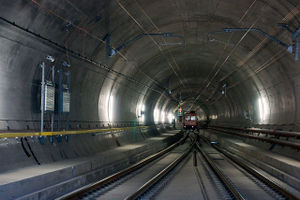
The Swiss economy earns roughly half of its corporate earnings from the export industry, and 62% of Swiss exports are destined for the EU market. The EU is Switzerland's largest trading partner, and economic and trade barriers between them are minimal. In the wake of the Swiss voters' rejection of the European Economic Area Agreement in 1992, the Swiss Government set its sights on negotiating bilateral sectoral agreements with the EU. After more than 4 years of negotiations, an agreement covering seven sectors (research, public procurement, technical barriers to trade, agriculture, civil aviation, land transport, and the free movement of persons) was achieved at the end of 1998. Parliament officially endorsed the so-called "Bilaterals I" in 1999, and the Swiss people approved them in a referendum in May 2000. The agreements, which had to be ratified by the European Parliament as well as legislatures in all 15 EU member states, entered into force on June 1, 2002. Switzerland has so far attempted to mitigate possible adverse effects of non-membership by conforming many of its regulations, standards, and practices to EU directives and norms. Full access to the Swiss market for the original 15 EU member states entered into force in June 2004, ending as a result the “national preference”. The Swiss agreed to extend these preferences to the 10 new EU members on September 25, 2005.
The Swiss Government embarked in July 2001 on a second round of bilateral negotiations with the EU known as “Bilaterals II”. Talks focused on customs fraud, environment, statistics, trade in processed agricultural goods, media, the taxation of savings, and police/judicial cooperation (dubbed the Schengen-Dublin accords). Amid a fierce political debate over the essence of Swiss-EU relations and populist warnings against EU workers and criminals entering Switzerland, the Schengen-Dublin package was approved on June 5, 2005, by a referendum of 54.6%. Fears of cheap labor coming from new EU member states have prompted the government to provide for tripartite surveillance committees to ensure that decent wages are enforced. The EU has still to ratify the extension of Schengen to Switzerland, and implement the bilateral agreements on research and development and media cooperation.
As part of the bilateral agreement on the taxation of savings signed in June 2003, Swiss banks will levy a withholding tax on EU citizens' savings income. The tax, which started on July 1, 2005, will increase gradually to 35% by 2011, with 75% of the funds being transferred to the EU.
On November 26, 2006, the Swiss electorate approved a government bill to contribute 1 billion Swiss francs (about $800 million) to the 10 new EU member states. In a nationwide referendum, 53.4% of voters accepted the “Eastern Europe Cooperation Act,” which entitles the government to spend 1 billion Swiss francs on projects in primarily Central European states over the next 10 years. Switzerland had pledged this contribution to share the burden of the EU's eastern expansion in order to facilitate the conclusion of the second set of bilateral negotiations with the EU. The right-populist Swiss People's Party (SVP), which prompted the referendum, was disappointed, but pleased that it mobilized a 47% opposition. The Eastern Europe Cooperation Act gives a new legal basis for Swiss aid to countries in Eastern Europe. The act has a 10-year term and replaces the former federal Law on Aid to Eastern Europe, which came into force in 1995. Since the fall of the Berlin Wall, Switzerland has spent SF 3.5 billion on about 1,000 aid projects in East-Central Europe to help countries in the region transform into market economies. Sixty percent of the SF 1 billion is to come from the budget of the departments of foreign and economic affairs, mainly from cuts in aid programs to other parts of the world. The remaining 40% will be taken from the regular budget of the federal administration. The funds are to be used on projects chosen by Switzerland and focused on education, trade promotion, environment, and internal security. The money is paid directly to the projects and does not go the EU cohesion fund in Brussels. Switzerland has no formal agreement with the European Union concerning these contributions. Instead, there is a Memorandum of Understanding (MOU) that sets out the general conditions of the Swiss commitment to the ten new EU member states. Under the MOU, almost half of the funding will go to Poland. Hungary's benefit will be SF 131 million, while the Czech Republic will receive SF 110 million.
The Swiss federal government remains deeply divided over whether to eventually join the EU, and in a March 2001 referendum more than 70% of Swiss voters rejected rapid steps toward EU membership. The issue of EU membership is likely to be shelved for several years, if not a decade. In May 2005, the government said it could sign a framework agreement with the European Union, as an alternative to joining the organization, to encourage dialogue and create a platform for closer cooperation.
Switzerland nevertheless expressed interest in reaching a third layer of bilateral agreements that would involve energy, the Galileo satellite navigation system, health, and agriculture. But recent harsh criticism by the European Commission against preferential cantonal tax treatment for foreign holdings cooled the political climate surrounding the EU. Unilateral trade retaliation—as threatened by the EU if the Swiss cantons do not change their cantonal tax regimes—has not occurred, but the political damage is done, including greater anti-EU feelings among the population. The pressure to negotiate with the EU could turn sour as the EU has already asked Switzerland to pay another SF 300-350 million ($240–280 million, on top of the SF 1 billion cohesion fund) to provide further financial aid to Romania and Bulgaria, which joined the EU on January 1, 2007. Unlike the November 2006 referendum, the newly enacted Eastern Europe Cooperation Act does not provide for an automatic referendum on further payments. The parliament will decide on the additional aid request.
The government also decided in November 2006 to once more consider adoption of the EU “Cassis-de-Dijon” principle for trade after a first setback in 2004. If adopted, EU products could be imported in Switzerland without having to go through the burdensome Swiss certification and Swiss language requirement process. Currently, Swiss retail prices are on average 20-40% higher than in the EU. If parallel imports are allowed under adoption of the Cassis-de-Dijion principle, prices could drop by 10%. Possible exceptions have been reduced from 129 products to 40, but hurdles remain on the labeling of alcohol contained in Alcopops, the Swiss ban of phosphates in washing machine powders, the real origin of “EU meat”, and on the stringent Swiss generic food production requirements. The “Cassis de Dijon principle” will not apply to the many farming and industrial products already covered by mutual recognition agreements (MRAs) under the EU-Swiss Bilaterals I and II; nor will it apply to other products such as pesticides, motor engines, and weapons that require an authorization. The impact, as a result, may not be as large as expected. Another issue is that Swiss and EU MRAs concluded with third countries may also benefit from adoption of the Cassis-de-Dijon principle (these goods would also have to receive WTO most favored nation status).
The government has reaffirmed its wish to strengthen ties with other non-EU trading partners in Asia and America. Exploratory talks on a Free Trade Agreement between the U.S. and Switzerland failed to result in negotiations, due to Swiss problems with free trade in agriculture, but the two sides did agree to a new framework for economic, trade, and investment discussions. This new agreement is the Swiss-U.S. Trade and Investment Cooperation Forum (the “Forum”) and is currently assessing areas where the two governments could facilitate greater trade and investment flows.
Switzerland ranks 17th among the main trading partners of the U.S. worldwide. The United States is the second-largest importer (11.5%) of Swiss goods after Germany (20%). The U.S. exports more to Switzerland each year than to all the countries of the former Soviet Union and Eastern Europe combined, and Switzerland imports more U.S. products and services than does Spain. In addition, the United States is the largest foreign investor in Switzerland, and conversely, the primary destination of Swiss foreign investment. It is estimated that 200,000 American jobs depend on Swiss foreign investments. Total U.S.-Swiss bilateral trade increased from $15.33 billion during 2003 to $16 billion in 2004.
In 2016, the Gotthard Base Tunnel, the longest tunnel in the world at 35 miles (57 km) was opened.[24] The Gotthard Base Tunnel was a part of the AlpTransit program, which sought to improve rail travel speeds from the north to south and advance European integration.[25][26]
History[edit]
Originally inhabited by the Helvetians, or Helvetic Celts, the territory comprising modern Switzerland came under Roman rule during the Gallic wars in the 1st century BC and remained a Roman province until the 4th century AD. Under Roman influence, the population reached a high level of civilization and enjoyed a flourishing commerce. Important cities, such as Geneva, Basel, and Zurich, were linked by military roads that also served as trade arteries between Rome and the northern tribes.
After the decline of the Roman Empire, Switzerland was invaded by Germanic tribes from the north and west. Some tribes, such as the Alemanni in central and northeastern Switzerland, and the Burgundians, who ruled western Switzerland, settled there. In 800, the country became part of Charlemagne's empire. It later passed under the dominion of the Holy Roman emperors in the form of small ecclesiastic and temporal holdings subject to imperial sovereignty.
With the opening of a new important north–south trade route across the Alps in the early 13th century, the Empire's rulers began to attach more importance to the remote Swiss mountain valleys, which were granted some degree of autonomy under direct imperial rule. Fearful of the popular disturbances flaring up following the death of the Holy Roman Emperor in 1291, the ruling families from Uri, Schwyz, and Unterwalden signed a charter to keep public peace and pledging mutual support in upholding autonomous administrative and judicial rule. The anniversary of the charter's signature (August 1, 1291) today is celebrated as Switzerland's National Day.
Between 1315 and 1388 the Swiss Confederates inflicted three crushing defeats on the Habsburgs, whose aspiration to regional dominion clashed with Swiss self-determination. During that period, five other localities (cantons in modern-day parlance) joined the original three in the Swiss Confederation. Buoyed by their feats, the Swiss Confederates continuously expanded their borders by military means and gained formal independence from the Holy Roman Empire in 1499. Routed by the French and Venetians near Milan in 1515, they renounced expansionist policies. By then the Swiss Confederation had become a union of 13 localities with a regularly convening diet administering the subject territories. Swiss mercenaries continued for centuries to serve in other armies; the Swiss Guard of the Pope is a vestige of this tradition.
The Reformation led to a division between the Protestant followers of Zwingli and Calvin in the German and French parts of the country respectively, and the Catholics. Despite two centuries of civil strife, the common interest in the joint subject territories kept the Swiss Confederation from falling apart. The traffic in mercenaries as well as the alienation between the predominantly Protestant Swiss and their Catholic neighbors kept the Swiss Confederation out of the wars of the European powers, which formally recognized Swiss neutrality in the Treaty of Westphalia in 1648. The Swiss remained neutral during the War of the First Coalition against revolutionary France, but Napoleon, nonetheless, invaded and took control of the country in 1797–98, replacing the loose confederation with a centrally governed unitary satellite state under French influence. The Swiss people highly disliked the massive changes that were occurring under Napoleon, and there were at least four coups d'état that occurred between 1800 and 1802.[27] Napoleon was forced to withdraw his troops in 1802, and after a civil war broke out, the Act of Mediation was signed on February 18, 1803, which restored much of the independence and autonomy of the Swiss Cantons.[27][28]
The Congress of Vienna in 1815 removed all remaining French control and re-established the old confederation of sovereign states and enshrined Switzerland's status of permanent armed neutrality in international law. In 1848, after a brief civil war between Protestant liberals seeking a centralized national state and Catholic conservatives clinging on to the old order, the majority of Swiss Cantons opted for a Federal State, modeled in part on the U.S. Constitution. The Swiss Constitution established a range of civic liberties and made far-reaching provisions to maintain cantonal autonomy to placate the vanquished Catholic minority. The Swiss amended their Constitution extensively in 1874, establishing federal responsibility for defense, trade, and legal matters, as well as introducing direct democracy by popular referendum. To this day, cantonal autonomy and referendum democracy remain trademarks of the Swiss polity.
Switzerland industrialized rapidly during the 19th century and by 1850 had become the second most industrialized country in Europe after Great Britain. During World War I serious tension developed between the German, French, and Italian-speaking parts of the country, and Switzerland came close to violating its neutrality but managed to stay out of hostilities. Labor unrest culminating in a general strike in 1918 marked the interwar period, but in 1937 employers and the largest trade union concluded a formal agreement to settle disputes peacefully, which governs workplace relations to the present day. During World War II, Switzerland came under heavy pressure from the fascist powers, which after the fall of France in 1940 completely surrounded the country. Some political and economic leaders displayed a mood of appeasement, but a combination of tactical accommodation and demonstrative readiness to defend the country helped Switzerland survive unscathed.
The Cold War enhanced the role of neutral Switzerland and offered the country a way out of its diplomatic isolation after World War II. Economically, Switzerland integrated itself into the American-led Western postwar order, but it remained reluctant to enter supranational bodies. Switzerland did not join the United Nations, even though Geneva became host to the UN's European headquarters, and the country played an active role in many of the UN's specialized agencies. Switzerland also remained aloof in the face of European integration efforts, waiting until 1963 to join the Council of Europe. It still remains outside the European Union. Instead, Switzerland in 1960 helped form the European Free Trade Area, which did not strive for political union. Following the Cold War, Switzerland joined the Bretton Woods institutions in 1992 and became a member of the United Nations in 2002.
| Copyright Details | |
|---|---|
| License: | This work is in the Public Domain in the United States because it is a work of the United States Federal Government under the terms of Title 17, Chapter 1, Section 105 of the U.S. Code |
| Source: | File available from the United States Federal Government. |
Source = [1]
See also[edit]
References[edit]
- ↑ https://www.swissinfo.ch/eng/god-continues-to-lose-believers-in-switzerland/46223632
- ↑ Kumar, Anugrah (December 5, 2011). Evangelical Churches Growing Fast in Switzerland. The Christian Post. Retrieved October 6, 2016.
- ↑ Mombelli, Armando (December 10, 2015). People’s Party gains second seat in cabinet. Swissinfo. Retrieved August 10, 2016.
- ↑ http://www.admin.ch/ch/d//pore/va/20091129/det547.html Official voting results (in German)
- ↑ "Anti-immigration party wins Swiss election in 'slide to the Right'", The Daily Telegraph, 19 October 2015. Retrieved on 19 October 2015.
- ↑ 6.0 6.1 Miserez, Marc-Andre (December 2, 2012). Switzerland poised to keep EU at arm's length. Swissinfo. Retrieved August 16, 2016.
- ↑ 7.0 7.1 7.2 Switzerland and the European Union (PDF) (2nd ed.). Federal Department of Foreign Affairs. 2016. Retrieved August 16, 2016.
- ↑ Swiss say 'no' to EU. BBC News. March 4, 2001. Retrieved August 16, 2016.
- ↑ Dacey, Jessica & Geiser, Urs (February 9, 2014). Swiss agree to curb immigration and rethink EU deal. Swissinfo. Retrieved August 16, 2016.
- ↑ Retrait de la demande d'adhesion de la Suisse a l'UE. Swiss Federal Council (2016-07-27). Retrieved on 2016-09-13.
- ↑ Goulard, Hortense (June 15, 2016). Switzerland withdraws application to join the EU. POLITICO. Retrieved August 16, 2016.
- ↑ Swiss to withdraw dormant EU bid. Swissinfo. June 15, 2016. Retrieved August 16, 2016.
- ↑ 'Only a few lunatics want to join the EU now': Switzerland WITHDRAWS application to become a European Union member state one week before the Brexit vote. The Daily Mail. June 16, 2016. Retrieved August 16, 2016.
- ↑ Swiss government wants to pledge more funding to EU budget. Swissinfo. March 28, 2018. Retrieved April 21, 2018.
- ↑ Multiple references:
- Hawkins, Awr (May 19, 2019). Swiss Voters Trade Rich Gun History for EU Gun Controls. Breitbart News. Retrieved May 20, 2019.
- Keaten, Jamey (May 19, 2019). Swiss voters approve tighter gun laws, lining up with the EU. Associated Press. Retrieved May 19, 2019.
- Swiss voters approve tighter gun control, avoid EU clash. Reuters. May 19, 2019. Retrieved May 19, 2019.
- Wolverton, Joe (May 14, 2019). Swiss Referendum Requires Voters to Decide Between Guns or Globalism. The New American. Retrieved May 19, 2019.
- ↑ Strong demand seen for gun permits among Swiss. Swissinfo. January 4, 2017. Retrieved January 8, 2017.
- ↑ Alarm over rising gun sales. Swissinfo. January 5, 2017. Retrieved January 8, 2017.
- ↑ Road quality in Europe: the best and worst roads in Europe
- ↑ Report: Switzerland Halts Funding to Palestinian NGO over Alleged Terror Ties. Breitbart News. August 23, 2017. Retrieved August 26, 2017.
- ↑ Edwards, Rob (May 25, 1996). Swiss planned a nuclear bomb. New Scientist. Retrieved September 9, 2016.
- ↑ 7.4 States Formerly Possessing or Pursuing Nuclear Weapons. nuclearweaponarchive.org. Retrieved September 9, 2016.
- ↑ Swiss Nuclear Program. nuclearweaponarchive.org. Retrieved September 9, 2016.
- ↑ Shields, Michael (October 5, 2018). Era of bank secrecy ends as Swiss start sharing account data. Reuters. Retrieved October 5, 2018.
- ↑ Gotthard tunnel: World's longest and deepest rail tunnel opens in Switzerland. BBC. June 1, 2016. Retrieved September 9, 2016.
- ↑ AlpTransit: Overview. alptransit-portal.ch. Retrieved September 9, 2016.
- ↑ Barrow, Keith (June 15, 2016). Gotthard Base Tunnel: the final straight. railjournal.com. Retrieved September 9, 2016.
- ↑ 27.0 27.1 Swiss Revolution and the Helvetic Republic (1798). geschichte-schweiz.ch. 2004. Retrieved September 9, 2016.
- ↑ Swiss celebrate Napoleon's historic act. Swissinfo. February 20, 2003. Retrieved September 9, 2016.
Categories: [European Countries] [Landlocked Countries] [Christian-Majority Countries] [Switzerland]
↧ Download as ZWI file | Last modified: 02/08/2023 09:02:23 | 199 views
☰ Source: https://www.conservapedia.com/Switzerland | License: CC BY-SA 3.0
 ZWI signed:
ZWI signed: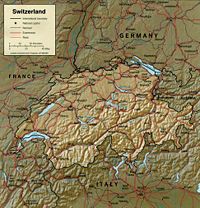
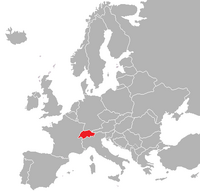
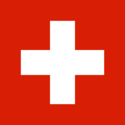

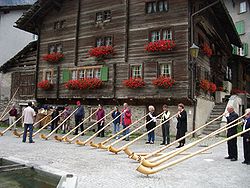
_in_Berne.jpg)
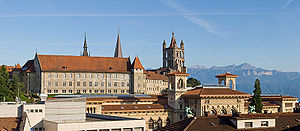
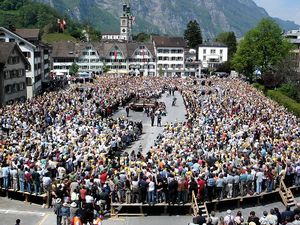
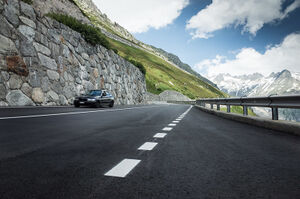

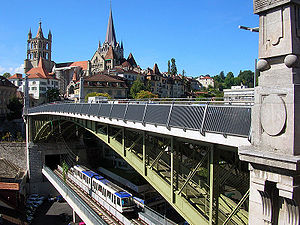
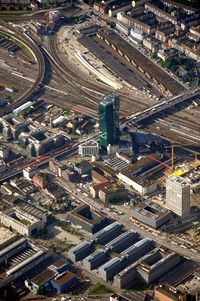
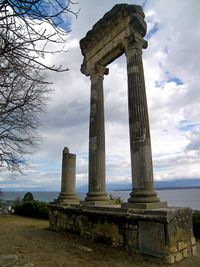
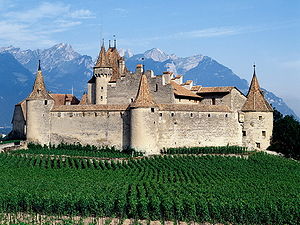
 KSF
KSF